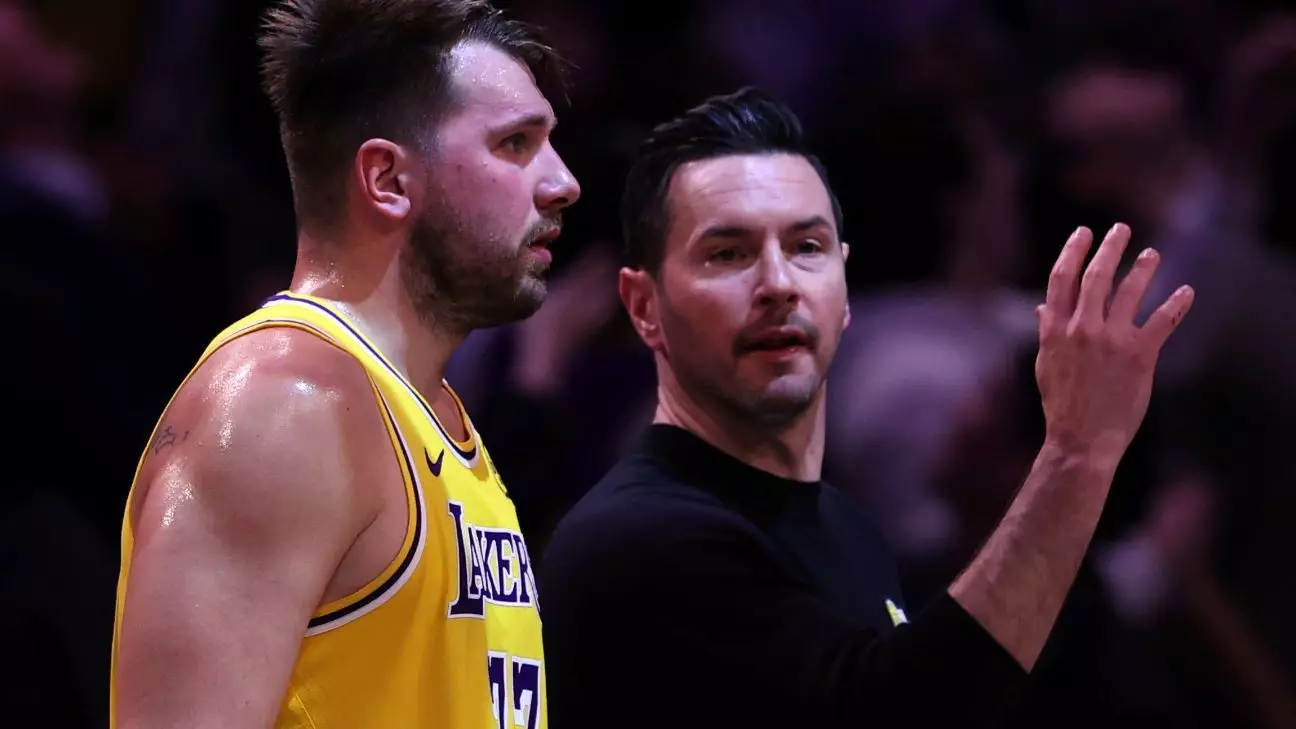In the landscape of professional sports, coaching often transcends mere strategy—it’s about cultivating a culture of accountability. After the Los Angeles Lakers’ close defeat to the Brooklyn Nets, head coach JJ Redick did not shy away from expressing his displeasure. Missing three key players, including the franchise superstar LeBron James, would typically elicit sympathy for a team struggling to maintain its form. However, Redick’s reaction highlighted an enlightening truth: injuries are an unfortunate part of the game, but they cannot serve as an excuse for a lack of effort and communication on the court. His emphasis on addressing what he perceived as “low-level communication” sends a clear message about the team’s need to rise above adversity, rather than succumb to it.
Redick’s remarks are critical, revealing a potential fracture in the team’s collective mentality. The Lakers displayed a promising start, leading by as much as 15 points in the early stages, but their inability to sustain that momentum points to deeper issues that transcend mere roster changes. A fundamental lack of effective communication becomes particularly glaring, especially in a sport where teamwork is paramount. Whether it’s making a proper pass or executing complex plays, the ability to align as a unit can often dictate game outcomes far more than individual talent.
Star Players and the Weight of Performance
Luka Doncic stepped onto the court with the heavy burden of filling the void left by James. Despite posting an impressive triple-double with 22 points, the realities of the match showed that his individual brilliance was insufficient to secure a win. His admission of responsibility for the team’s communication woes is noteworthy, showcasing maturity and self-awareness. It’s a refreshing perspective, as many athletes would deflect blame, but Doncic’s acknowledgment reveals a keen understanding of the importance of synergy among teammates, especially given the absence of a guiding force like James.
On the flip side, Austin Reaves, another prominent playmaker, openly expressed his frustration with his underwhelming performance. He recognized the heightened expectations placed upon him in James’s absence, underscoring the intense pressure young players often face when thrust into leadership roles. Both players’ critical self-reflection points to a culture that demands more than raw talent—it seeks accountability, growth, and learning from failures in real-time.
Role Players Rising to the Occasion
An intriguing subplot emerged in this game with the unexpected contributions from Lakers’ role players. Gabe Vincent showcased his ability to step into the limelight, scoring 24 points with an impressive shooting percentage. Likewise, rookie Dalton Knecht and Jordan Goodwin made their marks with impressive performances, demonstrating that the team possesses depth beyond its superstars. These moments of brilliance from lesser-known players inject a stirring sense of hope into the Lakers’ current plight.
However, while their performances deserve recognition, it also raises questions about the Lakers’ overall structure. Can a team genuinely depend on its role players without a clear plan or leadership in times of crisis? This dilemma lies at the heart of Redick’s challenge. The relationship between star players and role players can often dictate a team’s resilience, and learning to blend these dynamics is crucial for long-term success.
Looking Ahead: A Testing Schedule and Early Challenges
As the Lakers look to rebound from their current losing streak, the road ahead appears daunting. With LeBron James expected to be sidelined for at least one to two weeks, the pressure mounts. The Lakers face a daunting schedule that includes a back-to-back against formidable opponents—the Milwaukee Bucks and Denver Nuggets. The outcome of these games will be a telling indicator of the team’s character and resilience.
What remains paramount is Redick’s proactive approach. His decision to prioritize a practice session before the upcoming games underscores the urgency for improvement. Whether it’s refining strategies or fostering a more profound sense of unity, this practice could be a pivotal moment—a chance to regroup and renew their focus.
Ultimately, the call for a “next-man-up” mentality resonates strongly within the squad’s ethos. As injuries and setbacks are inevitable in a long season, the ability to adapt and respond collectively is what will define the Lakers not just in the immediate term but throughout the grueling journey ahead. Building not just players but a dynamic team culture will be vital. Each member must recognize their role, elevate their game when called upon and embrace the grind of a demanding schedule. In this pursuit, the true character of the Lakers can emerge, setting the stage for potential greatness in a league where resilience often reigns supreme.


Leave a Reply